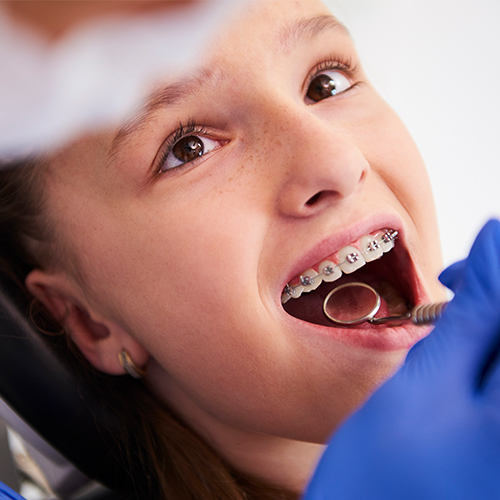Pediatric Dentistry
Pediatric dentistry is a branch of dentistry concerned with the examination and management of children’s dental health.
Dental procedures are generally regarded as aggressive and painful experiences that most people would prefer to avoid, particularly in children. However, it is critical that children have their milk teeth checked by paediatric dentists on a regular basis for evidence of caries and tooth decay.
Pediatric dentists are most likely to see the following conditions:
Dental procedures are generally regarded as aggressive and painful experiences that most people would prefer to avoid, particularly in children. However, it is critical that children have their milk teeth checked by paediatric dentists on a regular basis for evidence of caries and tooth decay.
Pediatric dentists are most likely to see the following conditions:
Teething problems
If an infant’s teething is delayed, a paediatric dentist is consulted. Teeth and jaw development must be appropriate for the infant to be weaned onto solid foods. A good and timely eruption of teeth is also necessary for the development of appropriate speech.
Malocclusion or misaligned teeth
When the upper and lower jaws are closed together, the teeth do not meet. This is referred to as a malocclusion. This can cause issues with eating and speaking.
Malocclusion can cause pain when biting as well as injuries to the insides of the mouth, gums, and tongue. Pediatric dentists are in charge of using braces to correct the problem of misaligned teeth.
Malocclusion can cause pain when biting as well as injuries to the insides of the mouth, gums, and tongue. Pediatric dentists are in charge of using braces to correct the problem of misaligned teeth.
Dental caries and tooth decay
Despite the fact that milk teeth eventually fall out and are replaced by permanent teeth, it is critical that these teeth be well cared for. Children are more prone to tooth decay and, as a result, cavities, which can expose the inner dental pulp to bacteria and cause toothaches.
Children are more prone to dental plaque and tooth decay because they are more likely to consume sugary, sticky foods and do not practise good dental hygiene as well as adults. As a result, paediatric dentists encounter tooth decay on a regular basis.
1. Gingivitis and dental abscesses are just as common in children as they are in adults.
2. Regular dental health checkups, combined with good oral hygiene practises such as daily brushing and flossing of the teeth, should help children maintain a healthy set of teeth for life.
Children are more prone to dental plaque and tooth decay because they are more likely to consume sugary, sticky foods and do not practise good dental hygiene as well as adults. As a result, paediatric dentists encounter tooth decay on a regular basis.
1. Gingivitis and dental abscesses are just as common in children as they are in adults.
2. Regular dental health checkups, combined with good oral hygiene practises such as daily brushing and flossing of the teeth, should help children maintain a healthy set of teeth for life.
- What is the significance of milk teeth?
What is the significance of milk teeth?
Milk teeth are critical because they must last 6-10 years until the permanent set develops. teeth. If teeth are extracted before their natural time of decay, space for permanent teeth may be lost. This can result in issues such as adult tooth crowding.
- What is the significance of baby teeth?
What is the significance of baby teeth?
Your child’s baby teeth are crucial. Children require strong, healthy teeth to chew their food, speak, and smile properly. Baby teeth also keep adult teeth in place in the jaw. When a baby tooth falls out too soon, the teeth next to it may drift into the empty space.
When the time comes for the adult teeth to emerge, there may not be enough space. This can result in crooked or crowded teeth.
- How can baby bottle tooth decay be prevented?
How can baby bottle tooth decay be prevented?
Parents may be unaware that a baby’s teeth can decay soon after they appear in the mouth. It may be too late to save the teeth by the time decay is discovered. Follow the tips below to help prevent this from happening to your child:
Wipe the baby’s gums with a clean gauze pad after each feeding. Begin brushing your child’s teeth as soon as the first tooth appears. Clean and massage gums in toothless areas, and begin flossing when all baby teeth have erupted, which is usually by age 2 or 2 1/2.
Never put your child to bed with a bottle that contains milk, formula, fruit juice, or sweetened liquids.
Avoid filling your child’s bottle with sugary drinks or soft drinks.
If your local water supply lacks fluoride (a substance that helps prevent tooth decay), consult your dentist about how your child should obtain it.
Begin by taking your child to the dentist by his or her first birthday. Make regular visits. If you suspect your child has dental issues, take him or her to the dentist as soon as possible.
- Fluoride treatment
Fluoride treatment
Fluoride: Nature’s Cavity Fighter
Fluoride has been shown to be effective in preventing and reversing the early stages of dental caries (tooth decay). Fluoride achieves its decay prevention effects in a variety of ways, according to researchers. It strengthens the tooth structure, making teeth more resistant to acid attacks. When bacteria in plaque break down sugars and carbohydrates in the diet, acid is formed.
Fluoride is available in two forms: topically and systemically. Topical fluorides strengthen teeth, making them more resistant to decay. Topical fluorides include toothpastes, mouth rinses, and fluoride therapies administered by a professional.
- Tooth Decay
Tooth Decay
Never put your child to bed with a bottle in his or her mouth. Bottled liquids (including milk) that sit in the mouth can cause tooth decay quickly. Allow your child to drink water or eat snacks without first brushing their teeth.
A baby’s thumb or pacifier sucking is common and normal. However, if either habit continues past the age of three or four, it may result in tooth or jaw problems. If your child uses a pacifier, an orthodontic pacifier is the best option for his or her teeth and jaws.
Consult your dentist if your baby or adult teeth are crooked or do not come in properly.
If you notice brown or black spots on your child’s teeth, contact the dentist.
If an adult tooth becomes loose, contact your dentist.
If you have a tooth that has been knocked out, seek emergency dental care. Don’t squander the tooth. Place it in milk until it can be reinserted.
- Sealents
Sealents
Indications
-
Sealing enamel pits and fissures in teeth helps prevent cavities.
-
Fluoride is present and released.
-
It adheres to the enamel.
-
Ideal for use with paediatric sealants.
-
Site-specific sensitivity is treated.
-
Root surfaces that are exposed
-
Following scaling and root planning, protect the freshly cleaned surfaces.
-
Site-specific protective coating for potentially hazardous surfaces
-
In and around orthodontic brackets (after bracket installation)
-
Jewelry worn around the teeth
-
Surfaces prone to acid erosion
-
Lesions that aren’t cavitated (white spots)
-
Molars that have partially erupted



